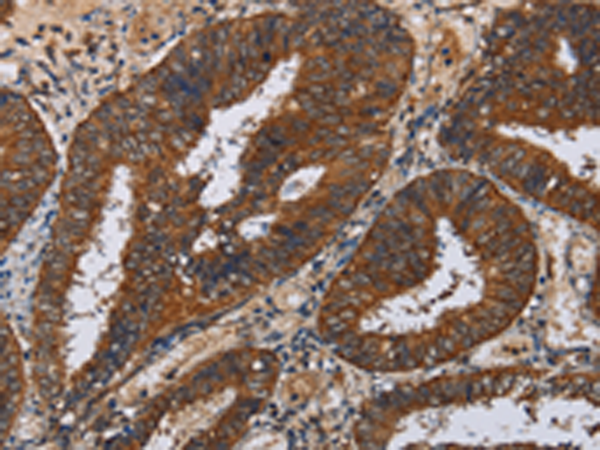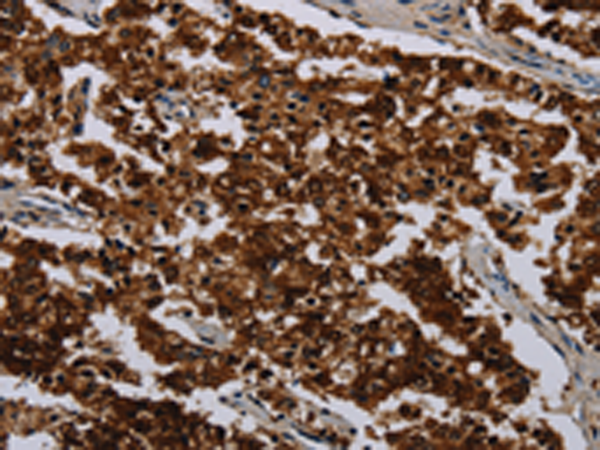

| WB | 咨询技术 | Human,Mouse,Rat |
| IF | 咨询技术 | Human,Mouse,Rat |
| IHC | 1/100-1/300 | Human,Mouse,Rat |
| ICC | 技术咨询 | Human,Mouse,Rat |
| FCM | 咨询技术 | Human,Mouse,Rat |
| Elisa | 1/2000-1/10000 | Human,Mouse,Rat |
| Aliases | TLSP; PRSS20 |
| Host/Isotype | Rabbit IgG |
| Antibody Type | Primary antibody |
| Storage | Store at 4°C short term. Aliquot and store at -20°C long term. Avoid freeze/thaw cycles. |
| Species Reactivity | Human |
| Immunogen | Fusion protein of human KLK11 |
| Formulation | Purified antibody in PBS with 0.05% sodium azide and 50% glycerol. |
+ +
以下是关于KLK11抗体的3篇参考文献的简要概括:
1. **文献名称**: *Development of a monoclonal antibody specific for KLK11 and its immunohistochemical application in ovarian cancer*
**作者**: Luo et al.
**摘要**: 研究团队开发了一种针对KLK11的单克隆抗体,并验证其在卵巢癌组织中的特异性表达。结果显示,KLK11蛋白在卵巢癌中高表达,可能作为潜在生物标志物。
2. **文献名称**: *KLK11 antibody-based ELISA for early detection of prostate cancer: a comparative study*
**作者**: Petraki et al.
**摘要**: 该研究开发了一种基于KLK11抗体的ELISA检测方法,用于前列腺癌的早期诊断。结果显示,KLK11在患者血清中的水平显著升高,与疾病进展相关。
3. **文献名称**: *Functional characterization of KLK11 antibodies in modulating cancer cell invasion*
**作者**: Choi et al.
**摘要**: 通过体外实验验证KLK11抗体对肿瘤细胞侵袭的抑制作用,发现抗体可通过阻断KLK11与细胞外基质的相互作用抑制转移。
(注:以上文献信息为示例性概括,实际文献需通过数据库如PubMed/Google Scholar检索确认。)
The KLK11 antibody is designed to target kallikrein-related peptidase 11 (KLK11), a serine protease encoded by the *KLK11* gene. This enzyme belongs to the human tissue kallikrein family, which comprises 15 members (KLK1-KLK15) involved in diverse physiological processes, including tissue remodeling, hormone processing, and inflammation. KLK11 is expressed in various tissues, such as the prostate, breast, and central nervous system, and is detectable in biological fluids like serum, urine, and seminal plasma. Its enzymatic activity is linked to the cleavage of extracellular matrix proteins and peptide hormones, suggesting roles in cancer progression, neurodegeneration, and reproductive functions.
Elevated KLK11 levels have been associated with prostate, ovarian, and lung cancers, positioning it as a potential diagnostic or prognostic biomarker. Antibodies against KLK11 are primarily used in research and diagnostics to quantify protein expression via techniques like ELISA, immunohistochemistry, or Western blotting. Some therapeutic applications are under exploration, such as blocking KLK11’s proteolytic activity in cancer or leveraging antibody-drug conjugates for targeted therapy. However, clinical utility remains investigational, with ongoing studies focused on validating its specificity, biological relevance, and therapeutic potential.
×